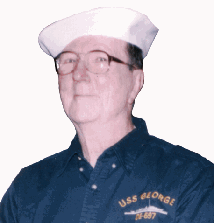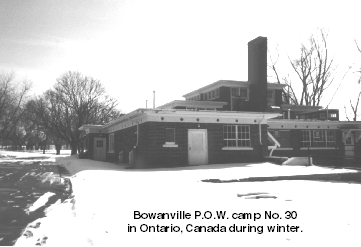|
They considered themselves to be the luckiest military officers of World War II. The camp buildings were built of red brick and heavily insulated against the bitter-cold winters. They ate three good meals a day, with coffee and snacks in between. The P.O.W.'s were furnished with shoes and work clothes. They were even paid a small amount of money, when on work detail. But I, Lieutenant Ulrich Steinhilper, a cocky 23 year old Luftwaffe fighter pilot... I had only one thought in my whole brain. "Escape, escape, I must escape to the United States of America." (This was before the United States had entered the war.) I will make my way to New York City, which is a major seaport. There I can stow-a-way onboard a ship bound for Germany. Then, I can get back into the air war!
For my second escape attempt, I will leave camp and just disappear into the snow. It has been snowing for several days and everything is covered in white. I have obtained a big, heavy winter coat, it should keep me warm. I have snitched a white bed sheet and cut and sewed it on my coat. This way my coat will be solid white, as my trousers are. I did not know too much about snow, as the German winters are mild where I grew up. This time I snitched a pair of wire cutters from the machine shop. When the watchtower guards were not looking, I began to cut the strands of barbed wire. In the cold, it made a loud noise, like a gun shot. I held my breath, hoping that none of the guards would hear. As the last strand of barbed wire snapped, I ran out into the snow. Here I am again free as an "eichel-haher!" (Jay bird.)
But, it was colder than I expected and the snow was deeper, too. This time I decided to go north, to the city of Montreal. I did not realize it was almost 200 miles away. However, I was determined to get there somehow, although I was getting very cold. I kept floundering and stomping through the snow, forcing myself to keep moving. I was able to hitch a ride part of the way. I told the driver that I was a misplaced Hungarian refugee.
Somehow, I finally reached the train station in Montreal City. Stiffly, I crawled up under the waiting train bound for the U.S.A. I just lay there... waiting, waiting, and waiting! And getting colder, colder, and colder! Then the conductor came along and beat the side of the railroad car with a ball bat. Would you believe this caused my same dumb leg to fall down on the railroad track?! The conductor blew his whistle and two royal Canadian mounted policeman came running. I was already trying to dismount from the train, but my hands were almost frozen to the undercarriage rod. As one of the policeman was handcuffing me, I complained bitterly. "Why can't you men turn your back on me and let me ride under there into the U.S.A.? Nobody would ever know anything about it!" The conductor laughed and said, "Why you crazy Nazi, we have just saved your life! The weather is so bitterly cold and the snow is so deep, if you had ridden all the way to Buffalo, you would have become a frozen German corpse!" On the way back to camp again, I had to admit he was right. I would have frozen to death, or the snow was so deep, it would have smothered me! Now, I must relax and plot my next escape. I knew I would have oodles of free time, for I would probably get two weeks on bread and water this time!
For my third escape, I used the help of "Albert," another fighter pilot from my old squadron. I decided that we would paint the fence posts in the front of the camp, and then just walk away. At night, we took pieces of lumber from under the floor. We began to build two ladders to climb over the fence. The ladders were hidden behind the stage in our theater. We were encouraged to perform various events. We put on plays and we even had a big band, but did not like playing jazz. As the two ladders neared completion, Albert and I "borrowed" two painters uniforms. Then, we took the two ladders and leaned them against two of the the 8 ft. fence posts. We had also "borrowed" two cans of white paint. All of the other P.O.W.s in camp were secretly watching our escape attempt. Most of them were betting that we would not get out of camp, but the guards thought that we were hired civilian painters and ignored us. So, we painted on the inside of the two posts, then placed one ladder on the outside of the fence. As we climbed down we painted the outside of the post. It was hard for us to keep a "poker face" as we realized that we were indeed free! Albert and I carefully sat down our two cans of paint and picked up our ladders. "Coffee break! Coffee break!" we shouted at the two guards in the watch tower.
Then, we very calmly walked off... into the woods! We had other clothes hidden under our painter uniforms. We also carried fake ID cards showing that we were Hungarian refugees. It took us four days to reach the big city of Montreal, for we had to walk all of the way there. All we could find to eat were some apples picked off a farmer's tree. (We tried to catch the farmer's dog, but could not get close enough, for in Germany, dog meat was considered a delicacy, especially the dachshund.) Now, Montreal was indeed a big city and we could not find the train depot. Something that big should have been easy to locate, but we searched for two hours. Then, our luck changed completely as a mounted policeman approached. "Excuse me, sir," I said, "we are looking for the train station. We are poor Hungarian refugees, here are our ID cards." The Montie eye-balled us with very great suspicion, then replied, "Throw up your bloody hands... you are both under arrest! We have just received a bulletin about two escaped Nazi P.O.W.s and you two fit the description to a bloody tee!" So ended Albert and Ulrich's bid for freedom and escape back to the "Fatherland" (Germany).
With the United States at war with Germany, how did they plan to travel back across the Atlantic Ocean? At this point in time, April 1942, wolf-packs of Nazi submarines were prowling the Atlantic shores of Canada and the United States. They were sinking our cargo ships within sights of our beaches. One of the subs would be contacted by radio to pick up any stragglers. (Lieutenant Ulrich Steinhilper leaves us with these gems: As you Americans say in your baseball games, three strikes and you are out! I have tried three times to escape back to the shooting war in Nazi Germany! So now that must mean I am out!)
Source: The History Channel
.
|
|



